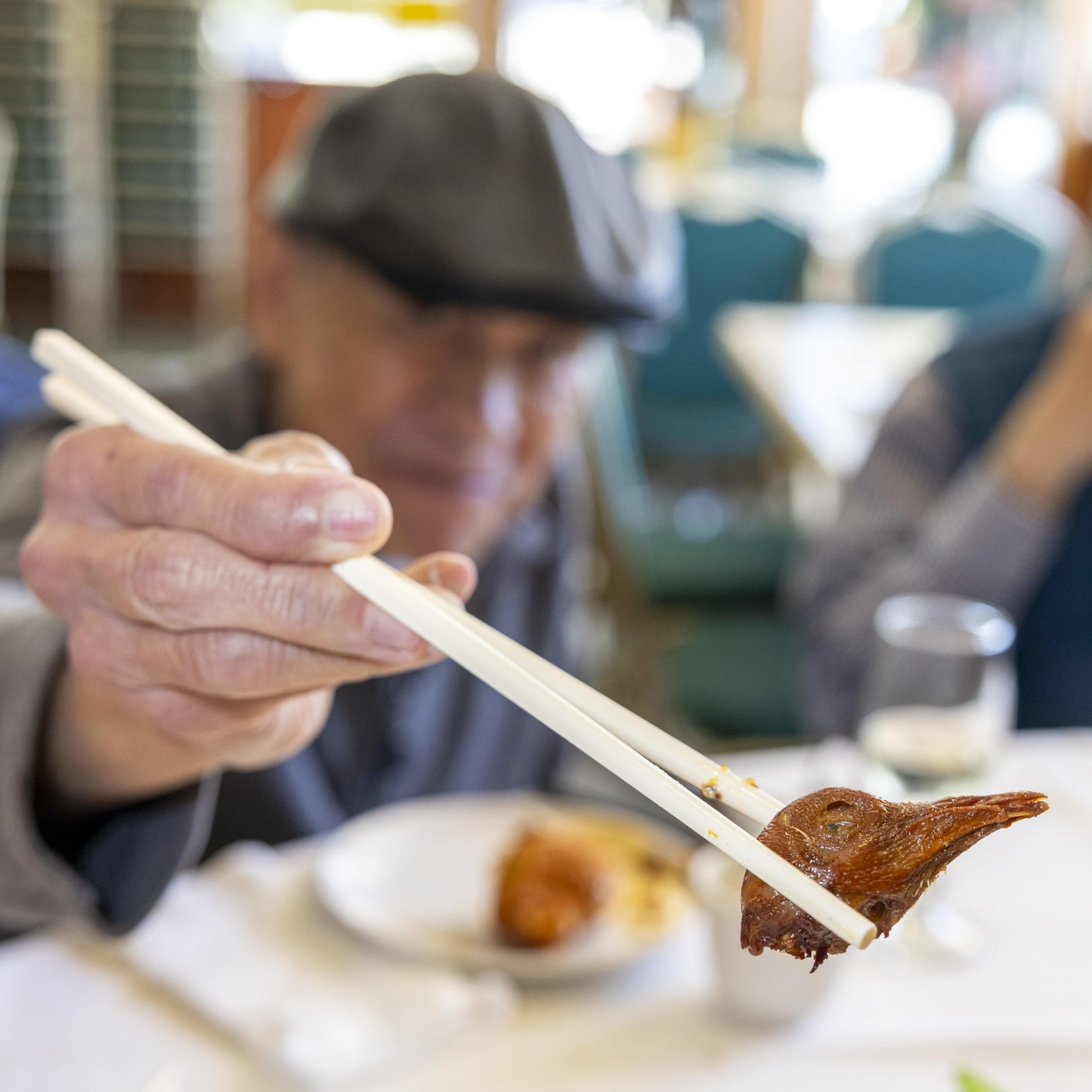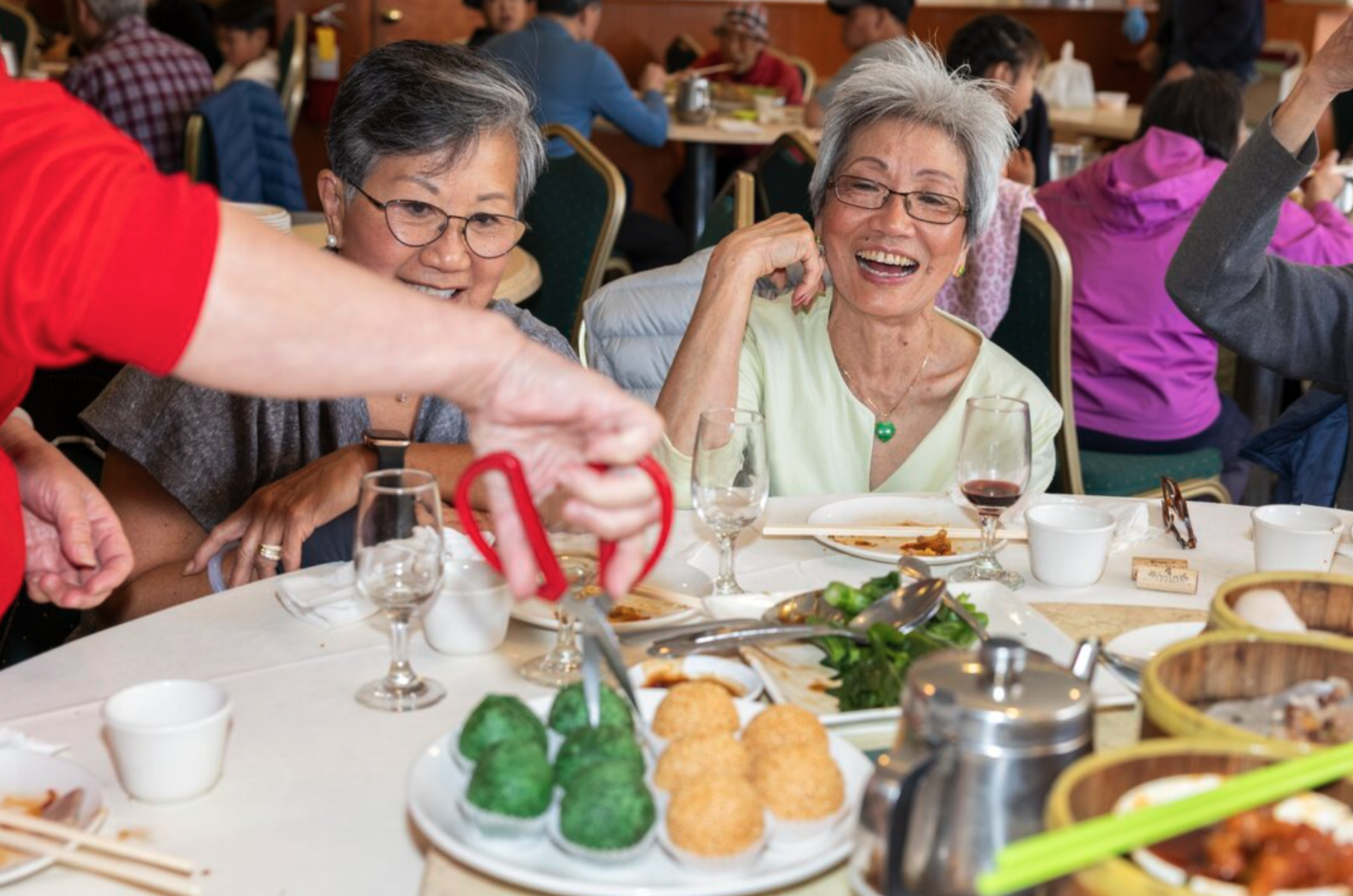An hour into lunch at Riverside Seafood Restaurant (opens in new tab) in Parkside, the lazy Susan is overflowing.
A steamer full of har gow is scooted over to make room for deep-fried shrimp balls with the tails poking out. There is burnished roast squab with pepper, salt, and lemon wedges, plus a platter layered with ham, shiitakes, gai lan (Chinese broccoli), and a dismantled steamed chicken, its glistening, yellow skin and bone-in flesh sliced into pieces. A symbol of togetherness, the head of the bird is placed artfully atop the plate, beak agape, eyes closed in gentle repose.
From the round table, skilled chopstick users reach in from all angles. Eight highly opinionated, food-obsessed friends who’ve been alive for a cumulative 500 years dig in, devouring a total of 14 Hong Kong-style Cantonese dishes for the next two hours.
The tight-knit, guffawing food lovers appropriately call themselves the Insatiables. “We’re the inseparable, insufferable Insatiables — a triple whammy! We’ll drive, we’ll fly, we’ll dive for food!” exclaims Albert Cheng, the vivacious instigator of the group, sitting next to Anne Cheng, his wife of 53 years.

Cheng’s curiosity spawned the Insatiables, which came to be in 2008, when he met former food writer Patricia Unterman through Vivian Zaloom, a lawyer and friend from his days as executive director of the Chinatown North Beach Youth Council. At that point, Zaloom had just moved back from Tokyo, where her husband, Tony (the kind of guy who has degrees from Princeton and Harvard and speaks fluent Mandarin and Japanese) had worked as a lawyer. Diane Lee, a friend of the Zalooms, is here too, as is Yin-Wah Ma, whose husband also worked as a lawyer in Japan.

“The informal dining among foodie friends gradually evolved into what it is today,” says Unterman. “Al likes to spread the word on things culinary and Chinese and has spent a lifetime doing that. Our original group just brought on more hungry friends.” They’ve met at more than two dozen restaurants and even traveled together to Vancouver to search for the best xiao long bao.
Many members of the unofficial “club” are in their 70s; the newest addition to the group is also its oldest member, 91-year-old Fern Smith. The fact that she is a former U.S. District Court judge (opens in new tab) — not someone who has professionally opined on food — is no matter. “She ate everything at our last dinner,” Cheng says. “That was the test.” (Not present is Cheng’s son, who is 41 and the youngest Insatiable.)

Not one of the Insatiables, barring Unterman — the founder of Hayes Street Grill (opens in new tab) and former lauded food critic for the San Francisco Examiner — has worked in the restaurant industry. Yet this gathering of diners represents food nerdery at its finest.
In the cacophony of conversation, fueled by bottles of good wine from Cheng’s own cellar, there’s talk of that time they had deer penis at Old Mandarin Islamic Restaurant — or was it lamb testicles? And does anyone know where to get live soft-shell crab? How about the last time they had concubine clams? The conversation is like an in-person, food-obsessive Reddit thread.

A server arrives to squeeze in a plate of lightly fried two-bite capelin, a fish related to smelt, its rich roe intact. This reminds Ma to ask Unterman, “Did you get the shad roe this year?” Unterman nods victoriously. Ma’s face falls. “Oh, I didn’t get the email,” she says, her disappointment at losing the fish-egg lottery palpable.
Salted egg-yolk-fried pumpkin is set down. Someone grumbles that it’s not seasonal. However, the roasted squab is getting raves. The style of preparation is from Zhongshan, the region of China from which the Riverside chef, as well as Cheng and Zaloom’s families, hail.
Cheng, 75, is particularly interested in a connection to his heritage. A fourth-generation Chinese-American who was born in the Philippines, he is a retired educator who was an integral part of the Chinese Cultural Foundation for years and continues to lead trips to China for Friends of Roots (opens in new tab), a SF-based nonprofit that helps people journey to their ancestral villages. Cheng first stepped foot in China in 1989 and has been there more than 60 times.
Long ago he was reminded that enjoying food is one of life’s gifts. In the mid-1970s, Cheng was diagnosed with esophageal achalasia, a rare condition that makes it hard to swallow. His doctor said he had two years before he wouldn’t be able to eat and drink normally. Cheng took this less as a dining death sentence and more as a directive: “I thought, I’ve got two years to eat the best shit I can find!” he says.
And so he did — and has continued to for some 40 years. His condition, which has been resolved (in part, he says, due to the magic of honey and cider vinegar), never got in his way.
Though the restaurants the Insatiables patronize run the gamut, they steer toward locally owned Chinese establishments like Riverside. Back in the day, Unterman would often use Cheng as a resource for her reviews, taking him along as an expert and noting his recommendations. “I thought maybe this is how I can support these small businesses,” says Cheng. “They are the backbone of America.”
Today, Cheng posts detailed accounts of his dining capers on Bay Area Eats (opens in new tab), a 140,000-person Facebook group that was started during the pandemic to support small businesses. His last post waxes in minute detail about Sichuan specialist Tianfu Restaurant (formerly Chef Sha) in San Mateo and Grandmaster Chef Zeng Dai Quan, complete with a photo of Cheng, wearing his signature leather newsboy cap, smiling like a ham while holding up a platter with a whole pickled fish.
“You could do a whole doctorate degree with this chef,” Cheng says, marveling at Zeng’s knowledge of Sichuan cuisine, which has 24 flavors, the most common being the spicy-numbing one known as mala.

At Riverside, I ask the Insatiables if they’ve been to Four Kings, the hotter than hot little Cantonese restaurant in Chinatown that was named one of Bon Appetit’s 20 best new restaurants of 2024 (opens in new tab). Cheng says no. Unlike the rest of the country, he and the Insatiables are not trying to tick trending spots off their bucket list. “I’m going to reserve my judgment about Four Kings,” Cheng says. “But we usually want to patronize first-generation chefs. They are trained and have been doing things like cutting meat for years.”
However, everyone agrees that there are plenty of Insatiables-worthy options in San Francisco. HK Lounge Bistro in SoMa is “worth every penny,” says Unterman. YH-Beijing has the best Peking duck in town. Harborview has the best suckling pig.

Where will the next meetup be? It’ll have to wait until next year, because in November, Cheng is off to China to lead another group for Friends of Roots. They agree on Viet Quan in Parkside, “the best Vietnamese.” “Oh, my God, have you tried the chicken dish there?” Unterman says. Cheng reminds her that “they also have the best squab in the city” and clarifies that the owners are ethnically Chinese.
A few hours into the feast, Riverside, which was empty at the start of the 11:30 a.m. lunch, has filled up with families having conversations over their own lazy Susans (which Cheng lets me know were popularized in the 1950s by the famous Johnny Kan’s restaurant (opens in new tab) in San Francisco’s Chinatown).
Though jokes about aging are lobbied around the table, Cheng has a moment of earnestness. “These are golden friends,” he says. “It’s an incredible blessing for Anne and me and my son that we can all eat together. When you get old, it’s important to have people around.”
